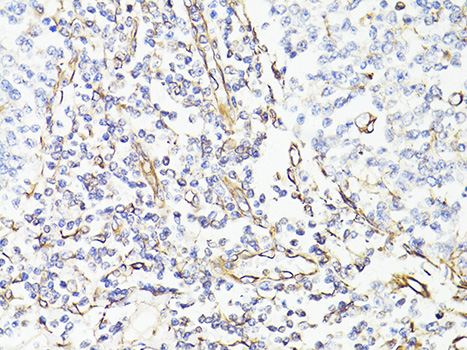Product Detail
Product NameVimentin Polyclonal Antibody
Host SpeciesRabbit
ClonalityPolyclonal
IsotypeIgG
PurificationAffinity purification
ApplicationsWB,IHC,IF
Species ReactivityHuman,Mouse,Rat
Immunogen DescRecombinant fusion protein of human Vimentin (NP_003371.2).
ConjugateUnconjugated
Other NamesVIM; CTRCT30; HEL113; vimentin
Accession NoSwiss-Prot#:P08670
NCBI Gene ID:7431
Uniprot
P08670
Gene ID
7431;
Calculated MW57kDa
FormulationAvoid freeze / thaw cycles.|Buffer: PBS with 50% glycerol, pH7.4.
StorageStore at -20˚C
Application Details
WB 1:500 - 1:2000
IHC 1:50 - 1:200
IF 1:50 - 1:200
Western blot analysis of extracts of various cell lines, using Vimentin at 1:1000 dilution.
Western blot analysis of extracts from normal (control) and Vimentin knockout (KO) 293T cells, using Vimentin at 1:1000 dilution.
Immunohistochemistry of paraffin-embedded human tonsil using Vimentin at dilution of 1:150 (40x lens).
Immunohistochemistry of paraffin-embedded human stomach using Vimentin at dilution of 1:150 (40x lens).
Immunofluorescence analysis of L929 cells using [KO] Vimentin at dilution of 1:100. Blue: DAPI for nuclear staining.
This gene encodes a member of the intermediate filament family. Intermediate filamentents, along with microtubules and actin microfilaments, make up the cytoskeleton. The protein encoded by this gene is responsible for maintaining cell shape, integrity of the cytoplasm, and stabilizing cytoskeletal interactions. It is also involved in the immune response, and controls the transport of low-density lipoprotein (LDL)-derived cholesterol from a lysosome to the site of esterification. It functions as an organizer of a number of critical proteins involved in attachment, migration, and cell signaling. Mutations in this gene causes a dominant, pulverulent cataract.
If you have published an article using product 27578, please notify us so that we can cite your literature.
et al,Telomerase reverse transcriptase gene knock-in unleashes enhanced longevity and accelerated damage repair in mice
, (2024),
PMID:







 Yes
Yes



